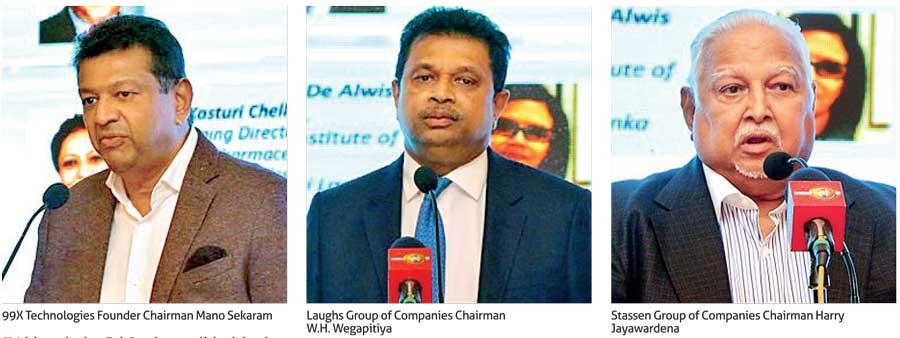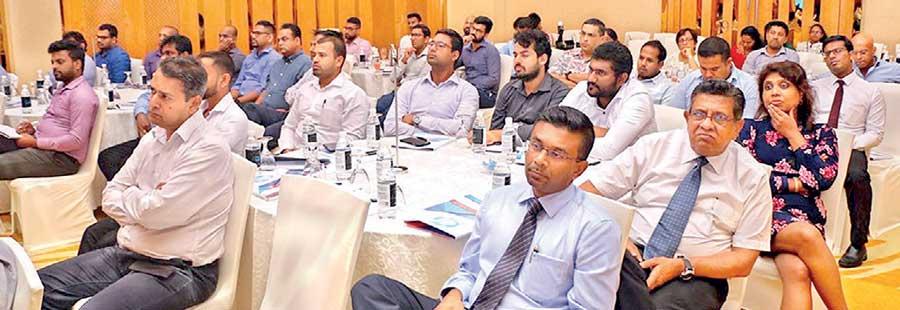

Panel discussion moderated by Dr. Rohantha Athukorala
The National Chamber of Exporters (NCC) conducted the Export Vision 2030 Forum, at Marino Beach Hotel, Colombo 3, recently.
99X Technologies (Pvt.) Ltd Founder Chairman Mano Sekaram, Laughs Group of Companies Chairman W.H. Wegapitiya and Stassen Group of Companies Chairman Harry Jayawardena were the main resource persons, who highlighted their experiences related to the main issues that impact the business climate in Sri Lanka.
Hemas Pharmaceuticals (Pvt.) Ltd, Hemas Logistics and Maritime Cluster and Hemas Holdings PLC Managing Director Kasturi Chellaraja Wilson, John Keells Holdings PLC Executive Vice President Roshanie Jayasundera-Moraes, Chartered Institute of Logistics and Transport Sri Lanka Chairperson Gayani de Alwis, Ramya Holdings (Pvt.) Ltd Chairman and National Chamber of Exporters of Sri Lanka President Ramya Weerakoon and the key speakers joined the panel discussion, which was moderated by well-known professional Dr. Rohantha Athukorala.
The forum was attended by a large number of private sector CEOs of export enterprises and other stakeholders.
Sekaram highlighted:
- The Vision for 2030 should encompass firstly the security of the nation and community and secondly discipline of the nation as in the case of Japan and South Korea. To achieve this, the need of the hour is decisive leadership not based on politics but national needs.
- It is imperative to create value systems among employees at all levels and prevent waste and corruption. For this purpose, it is necessary to elect honest politicians, who cherish democracy and different segments of the economy be led by experts and professionals.
- Every sector of the economy needs to have an export outlook focusing on one market place, which is the world. In this regard, it should be noted that the current Fourth Industrial Revolution is taking place through the disruption of traditional processes and through the creation of new value chains. Some examples highlighting this were the display of the first ‘three dimensional printed garment’ at Paris Show and adoption of hydroponics in agricultural production. To achieve this, a high-tech and skilled labour force is a necessity.
- The IT sector, which began with meagre export earnings of US $ 50 million, today earns US $ 1.5 billion for the country as opposed to the tea sector, which took a relatively very long period to achieve this goal. The per capita income of the IT sector is US $ 15,000, and the industry was built through the efforts of Sri Lanka entrepreneurs during the darkest era in the country.
- The challenges faced by the IT sector are the brain drain of local talent, which is the key to attract investments into the sector and the disparity between the supply and demand of professionals in the sector. While the sector currently requires 21,000 technical graduates, the country currently has only 9,000 graduates.
- In order to climb up the value chain to exploit opportunities in international business, it is imperative to innovate production processes and also to develop skills in specific areas. For example, while the Philippines has one million seafarers, Sri Lanka has only 8,000.

Wegapitiya highlighted:
- Although the Sri Lankan political leaders have presented ‘many visions’ since independence, the country has fallen behind in the Global Prosperity Index. Hence, all visions have failed.
- The sectoral strategies related to the economy have no cohesive force for value development. The country has never had a well-aligned national economic policy while the various policies are not aligned in one direction. The current National Export Strategy is only a micro strategy.
- Out of the 22 million people in the country, only 8.4 million people are economically active. Out of this number, 1.1 million are employed in the government sector, while the 3.4 million in the private sector are the real value creators engaged in 22,400 enterprises. The country cannot create exporters unless entrepreneurs are created.
- The economy of Sri Lanka is a consumption economy and not a manufacturing economy, while other countries are engaged in hi-tech manufacturing sectors. On the other hand, Sri Lanka has 1.1 million three-wheeler drivers.
- While the country earns US $ 1.5 billion through the export of the main plantation crop (tea), the country spends US $ 1.1 billion for the import of pharmaceuticals. This shows the need to support indigenous entrepreneurs to engage in import substitution and also to embark on exports. The current 1 percent of entrepreneurs in the country need to be increased to at least 2-5 percent through the adoption of desirable national economic policies.
- The country has valuable resource endowments including oil and gas deposits, coupled with a strategic location. However, no political leadership is provided to make use of these.
Jayawardena highlighted:
- Politics has ruined the progress of the country. That there is no discipline and rule of law is shown by the many demonstrations that take place on our roads.
- It is necessary for the country to learn from the mistakes of the past 30 years. The vision of the first Prime Minister of the country, D.S. Senanayake, which laid the foundation for the development of the agriculture sector through colonisation of certain parts of the country, is commendable.
- The country was a closed economy up to 1977 with encouragement to produce and exchange within the domestic economy. In this context, the British colonial masters need to be thanked for introducing an entrepreneurial approach to exports, wherein many foreign companies were engaged in production for export.
- The creation of many monster corporations by the state over the years has not paid the desired dividends. An example is Petroleum Corporation.
- The country has failed to make use of valuable resource endowments. For instance, in regard to the fisheries sector, although the country is surrounded by the sea, the marine resources are exploited mostly by others, while the catch is sold locally.
- In 1956, the country had only 11 ministries. However, today there is a large number of ministries with diverse and incongruent functions with severe negative impacts on the business environment and economy.
- It is imperative to elect honest politicians and decision makers if the country is to progress.
Panel discussion highlighted
- In Sri Lanka, value addition takes place in production and manufacturing sectors such as agriculture and apparel. However, in the agriculture sector, productivity is low. In countries such as Singapore, value addition takes place related to hi-tech products such as electronic and electrical products and where productivity is much higher.
- It is necessary for the country to focus on technology development. However, there is no political leadership to drive such an approach. The country has the world’s best graphite deposits, which have great potential and await the production of a range of value-added products such as graphine products. The country has no clear trade policy and administrative structures to make use of the available resources.
- In regard to strategies for development, Sri Lanka is a country with the lowest investments in research and development (R&D) activities. For example, the valuable ilmenite deposits of the country are exported in the raw form, while value-added products such as titanium dioxide are imported. In countries such as the US, the government takes the initiative to invest to make use of such resources and to encourage companies to export.
- The country should have a skilled labour force to engage in value-addition activities. For this purpose, it is necessary to think out of the box and to effect fundamental changes to the education system to achieve this objective. For instance, out of 200,000 students who sit for the Advanced Level examination, only around 30,000 are able to enter the universities for higher education. With the balance dropping off, some of them become three-wheeler drivers.
- Sri Lanka is no longer a country that provides low-cost labour. In this context, it is necessary to add value to products through engagement in R&D activities. In the 1980s and 1990s, the garment sector comprised around 800 companies. However, the sector now has around 200 companies, while many of the middlemen and agents have been eliminated. The sector has been able to capture upper-end markets with their own R&D activities.
- The country has been able to attract foreign direct investments mainly related to infrastructure. Policy support is necessary to attract beneficial investments to the manufacturing sector.
- The Logistics Performance Index of the country is very low and the country does not have adequate capacity in this sector.
- The functions of the large number of line ministries are unrelated, while representations made in this regard have been unheeded. There is no visionary leadership to overcome such issues.
- The taxation policy of the government has much to be desired, with sectors that are performing well coming under the radar for taxation, oblivious to the impact on the economy. For instance, the promising IT sector is taxed at present. This demonstrates the failure to execute meaningful policies.
- The country should not have fears of foreigners purchasing assets in the real estate sector, since such assets cannot be taken away. The country therefore needs meaningful policies in this regard.
- The government needs to encourage public-private partnerships in R&D activities. The need is for application-related R&D.
- Forums that are conducted at present such as the Ease of Doing Business Forum and Exporters Forum only serve to deal with the day-to-day activities of enterprises and not policy issues.




